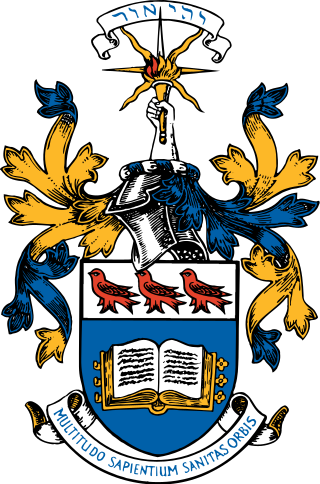
The University of Victoria (UVic) is a public research university located in the municipalities of Oak Bay and Saanich, British Columbia, Canada. Established in 1903 as Victoria College, the institution was initially an affiliated college of McGill University until 1915. From 1921 to 1963, it functioned as an affiliate of the University of British Columbia. In 1963, the institution was reorganized into an independent university.

The University of Manitoba is a public research university in Winnipeg, Manitoba, Canada. Founded in 1877, it is the first university of Western Canada. Both by total student enrolment and campus area, the University of Manitoba is the largest university in the province of Manitoba. Its main campus is located in the Fort Garry neighbourhood of Winnipeg, with other campuses throughout the city: the Bannatyne Campus, the James W. Burns Executive Education Centre, the William Norrie Centre, and the French-language affiliate, Université de Saint-Boniface in the Saint Boniface ward.
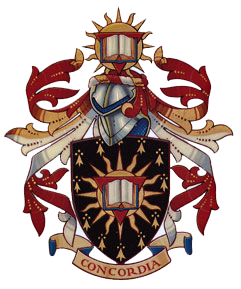
Concordia University is a public English-language research university located in Montreal, Quebec, Canada. Founded in 1974 following the merger of Loyola College and Sir George Williams University, Concordia is one of the three universities in Quebec where English is the primary language of instruction. As of the 2022–23 academic year, there were 49,898 students enrolled in credit and non-credit courses at Concordia, making the university among the largest in Canada by enrollment. The university has two campuses, set approximately 7 kilometres apart: Sir George Williams Campus is the main campus, located in the Quartier Concordia neighbourhood of Downtown Montreal in the borough of Ville Marie; and Loyola Campus in the residential district of Notre-Dame-de-Grâce. With four faculties, a school of graduate studies and numerous colleges, centres and institutes, Concordia offers over 400 undergraduate and over 120 graduate programs and courses.
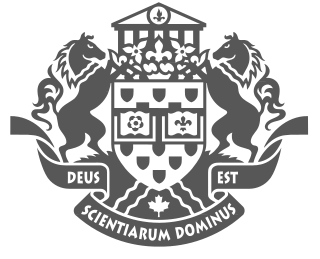
The University of Ottawa, often referred to as uOttawa or U of O, is a bilingual public research university in Ottawa, Ontario, Canada. The main campus is located on 42.5 hectares directly to the northeast of Downtown Ottawa across the Rideau Canal in the Sandy Hill neighbourhood.

Carleton University is an English-language public research university in Ottawa, Ontario, Canada. Founded in 1942 as Carleton College, the institution originally operated as a private, non-denominational evening college to serve returning World War II veterans. Carleton was chartered as a university by the provincial government in 1952 through The Carleton University Act, which was then amended in 1957, giving the institution its current name. The university is named after the now-dissolved Carleton County, which included the city of Ottawa at the time the university was founded.
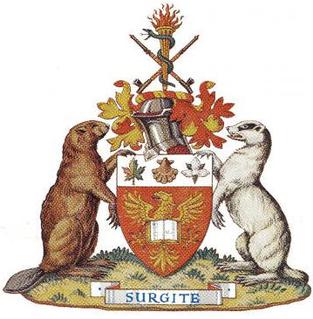
Brock University is a public research university in St. Catharines, Ontario, Canada. It is the only university in Canada in a UNESCO Biosphere Reserve, at the centre of Canada's Niagara Peninsula on the Niagara Escarpment. The university bears the name of Maj.-General Sir Isaac Brock, who was responsible for defending Upper Canada against the United States during the War of 1812.
Maastricht University is a public research university in Maastricht, Netherlands. Founded in 1976, it is the second youngest of the thirteen Dutch universities.

The Norman Paterson School of International Affairs is a professional school of international affairs at Carleton University that was founded in 1965. The school is based at Richcraft Hall on Carleton's campus in Ottawa, Ontario, Canada. Students, alumni and faculty of NPSIA are referred to as 'NPSIAns'.
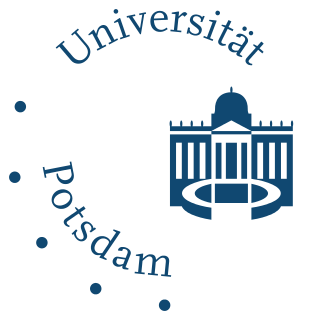
The University of Potsdam is a public university in Potsdam, capital of the state of Brandenburg, northeastern Germany.
The Faculty of Health, is one of six faculties at the University of Waterloo in Waterloo, Ontario, Canada. It has 183 staff and faculty members and over 2,700 full-time students. The current Dean of the Faculty of Health is Lili Liu. The former Faculty of Applied Health Sciences was officially renamed to the Faculty of Health on January 1, 2021.
Egerton University is a public university in Kenya. It is the oldest institution of higher education in Kenya.

The Arthur Kroeger College of Public Affairs, colloquially known as Arthur Kroeger College or AKC, is a specialized institute within the Faculty of Public Affairs at Carleton University in Ottawa, Ontario. The College offers undergraduate and graduate programs in the fields of public policy, international studies, and political management. These include the Bachelor of Public Affairs and Policy Management (BPAPM), the Bachelor of Global and International Studies (BGInS), the Master of Political Management (MPM), and the MA in Migration and Diaspora Studies (MDS).

The Telfer School of Management is a business school located at the University of Ottawa in Ottawa, Ontario, Canada. The school is named in honour of one university alumnus, Ian Telfer, who made a significant donation to the University of Ottawa. The donation of $25 million to the school's business program was the largest donation in Canadian history to be given to a business school, until Steven Smith's donation of $50 Million to the Queen's University Smith School of Business.

The Faculty of Engineering is one of six faculties at the University of Waterloo in Waterloo, Ontario, Canada. It has 8,698 undergraduate students, 2176 graduate students, 334 faculty and 52,750 alumni making it the largest engineering school in Canada with external research funding from 195 Canadian and international partners exceeding $86.8 million. Ranked among the top 50 engineering schools in the world, the faculty of engineering houses eight academic units and offers 15 bachelor's degree programs in a variety of disciplines.
The School of Public Policy and Administration at Carleton University (SPPA) is the public policy school of Carleton University in Ottawa, Ontario, Canada. Established in 1953, it is Canada's oldest graduate school in the field of policy studies and public management. Since its establishment, it has produced several prominent leaders within the Canadian public and non-profit sectors, and has led research activities in this area.
The Centre for Research on Educational and Community Services, or CRECS, is a research centre that collaborates with organizations in the education, social services and health sectors on research, evaluation, and training. Together, they work to improve social programs and policies for citizens, specifically those facing social exclusion.
The Institute for Science, Society and Policy (ISSP) is a multi-disciplinary unit at the University of Ottawa, Canada. It has a teaching, research and outreach mandate in the fields of science, technology and society.
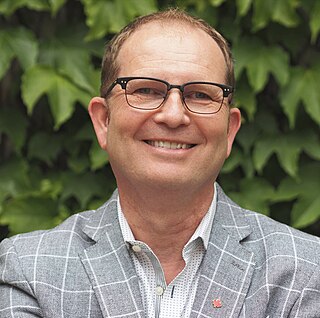
Marc Saner is a Full Professor at the University of Ottawa, Canada and Departmental Science Advisor to Natural Resources Canada.
Colleen M. Flood is the Dean of Queen's University Faculty of Law.
Linda Cardinal is a Franco-Ontarian political scientist. She is a University Professor and a Canada Research Chair in Canadian Francophonie and Public Policies at the University of Ottawa. Cardinal was elected a Fellow of the Royal Society of Canada in 2013 and honoured with the Ordre des Palmes Académiques and Member of the Order of Canada. She was also the first coordinator of the francophone studies program at the University of Ottawa.














